In this edition of Sliced, the 3D Printing Industry news digest, we cover the latest business developments, partnerships, and acquisitions in the additive manufacturing sector.
Today’s edition features new materials, reseller deals, and software, and professors Denis Cormier and Bey Vrancken awarded for their contributions in AM at the SFF symposium.
Read on for the most recent updates from Titomic, Stratasys, 3D Systems, SPEE3D, AML3D, and Roboze.
Nominations for the 2024 3D Printing Industry Awards are now open. Tell us who is leading.
Business deals and acquisitions from Protolabs, IperionX, Triton Systems, and more
Starting with business deals, Protolabs has acquired Axtra3D‘s Lumia X1 3D printer to enhance its Additive Manufacturing (AM) workflow. Known for its fast and high-quality production, Protolabs chose the Lumia X1 for its superior speed, accuracy, and surface finish.
This purchase allows Protolabs to optimize its services using BASF Ultracur 3D RG 3280 material, facilitating the production of high-performance parts and electrical connectors. This collaboration is expected to boost Protolabs’ capacity to meet growing customer demands across industries while maintaining rapid turnaround times.
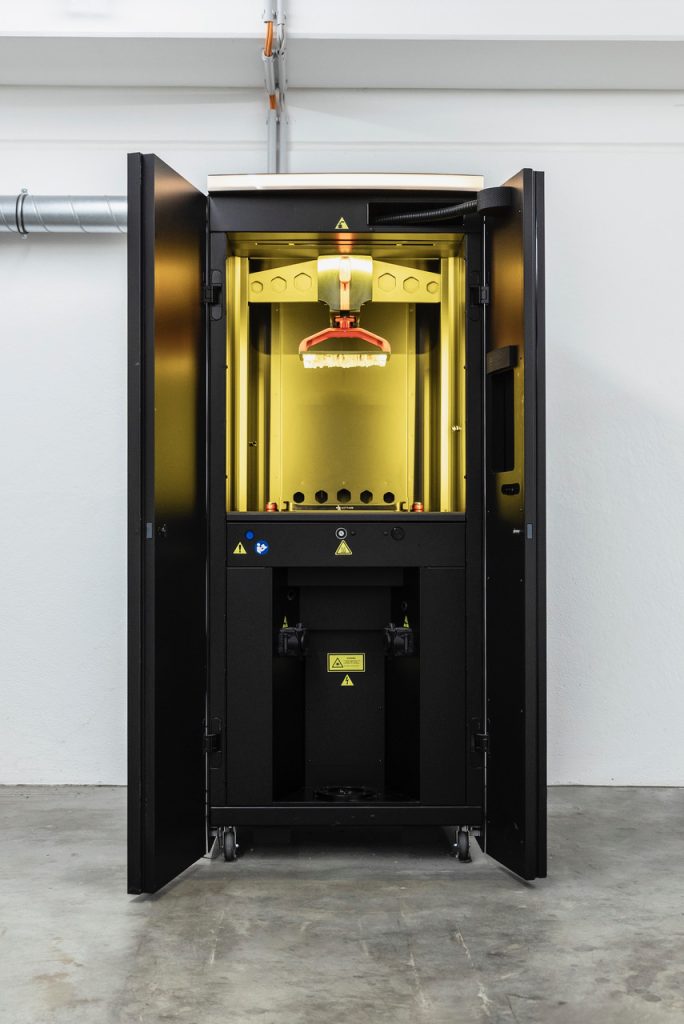
Next up, metal 3D printer manufacturers Titomic and Repkon have initiated a joint venture, starting with an AUD$2.3 million purchase of a TKF 1000 cold spray system. Located in Turkey, this facility will integrate Titomic’s TKF technology with Repkon’s flow-forming techniques to enhance barrel manufacturing.
By doing so, the company aims to deliver faster production times, lighter materials, and improved performance. This venture is important as it strengthens Titomic’s position in the defense sector and opens new opportunities for external customers using advanced manufacturing techniques.
Herbert Koeck, Managing Director of Titomic, said, “We anticipate the completed Facility will provide competitive and novel capabilities for the global defense sector and bolster Titomic’s position as a globally competitive manufacturing provider, expanding on Titomic’s reputation and agreements with major defense players such as Triton, BAE Systems, Boeing, and Airbus.”
Additionally, Triton Systems has purchased a low-pressure D523 System from Titomic for AUD$72,000, further strengthening their partnership. Recognized for its work in the defense and technology sectors, Triton Systems will use Titomic’s cold spray technology to enhance its manufacturing capabilities.
This follows the company’s recent acquisition of a high-pressure TKF System, reflecting Triton’s focus on utilizing both low and high-pressure solutions. The partnership supports the development of advanced manufacturing processes for U.S. industries through Titomic’s technology.
In other news, K3D has become the first international customer for Additive Industries‘ new MetalFab 300 Flex system, ordering two units to expand its metal additive manufacturing (AM) capabilities. Launched at the RAPID + TCT 2024, the MetalFab 300 Flex offers flexibility with a scalable build area, making it suitable for various applications.
This investment supports K3D’s growing demand across industries like aerospace, automotive, and defense, particularly for stainless steel and titanium parts. The system enables K3D to increase production capacity while minimizing financial risk through scalable features and flexible build options.
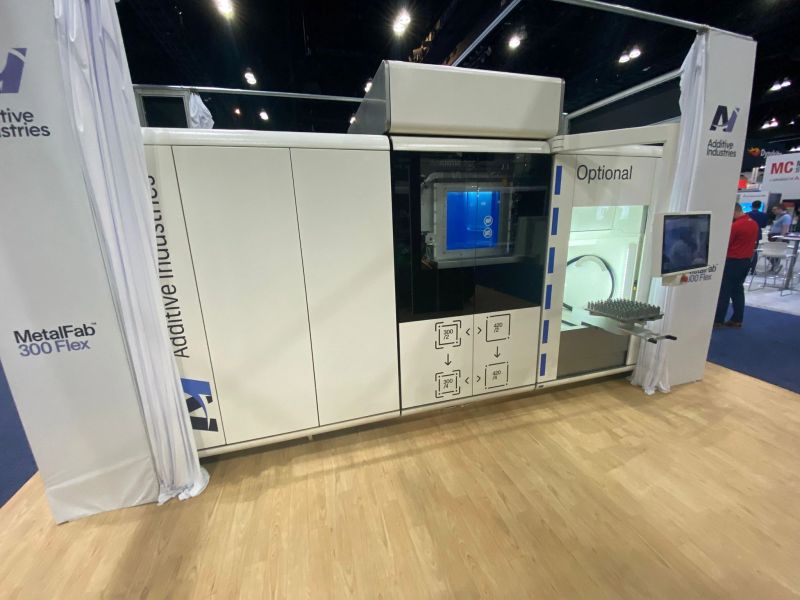
Mott Corporation has bought Renishaw’s RenAM 500S Flex machine to enhance its additive manufacturing capabilities for filtration and flow control components. The new system reduces setup and turnaround times by over 50% and improves performance consistency by 30%.
Its open architecture allows for customization, enabling Mott to optimize designs for specific applications, supporting industries like aerospace, bioreactors, and semiconductors. This upgrade accelerates development cycles and improves product reliability, expanding Mott’s production possibilities, says the company.
Tekna Holding has secured two orders for its TEK40 plasma systems, valued at CAD $2.0 million, with delivery scheduled over the next 12 months. Known for their advanced capabilities, these systems will support research and development in materials beyond Tekna’s usual industries. The orders contribute to Tekna’s growing backlog, which now totals CAD $6.2 million, says the company.
“We reaffirm our standing as the leading provider of advanced plasma systems to industry and academia. Our sophisticated systems product line provides a strong foundation for Tekna, while we continue to expand our own production of advanced materials,” says Luc Dionne, CEO of Tekna.
Cooksongold has launched a new industrial division, Cookson Industrial, to advance the use of precious metals in additive manufacturing (AM) for performance-critical applications. Focused on aerospace, healthcare, and glass fiber manufacturing, this division offers end-to-end services including consultancy, R&D, and production, with AM capabilities managed from its Birmingham site.
By producing precious metal powders like gold and platinum in-house, Cookson Industrial aims to de-risk development, shorten supply chains, and enhance performance in extreme environments where traditional alloys fail. Additionally, the company has partnered with the University of Birmingham for further research.
North Carolina-based titanium developer IperionX has successfully commissioned its Hydrogen Assisted Metallothermic Reduction (HAMR) furnace at the Titanium Manufacturing Campus in Virginia, achieving its first titanium de-oxygenation production run.
This development boosts titanium production capacity by over 60 times, with oxygen levels in the scrap titanium reduced from 3.42% to below 0.07%, surpassing ASTM standards. IperionX plans to optimize its processes by late 2024, with ambitions to lead U.S. titanium production at over 10,000 metric tons annually by 2030, offering a sustainable and cost-effective alternative to traditional methods.
Elsewhere, 3D-Fuel has regained its independence, allowing the company to refocus on quality, reliability, and customer support in the desktop 3D printing market. With a renewed emphasis on USA-manufactured and supported FDM materials, the company aims to meet the evolving needs of customers in a rapidly growing sector. Popular products like Standard PLA+, Tough Pro PLA+, and Pro PCTG are available in various colors.
Trumpf Ltd, based in Luton, is celebrating 50 years of delivering cutting-edge machine tools and laser technology to UK manufacturers. Founded in 1974 with a team of just five employees, the company has expanded to over 100 staff and now operates from a state-of-the-art facility in Luton.
To commemorate this significant milestone, Trumpf held several events, including a gala attended by executives from its German parent company. The company also hosted an open house, where they showcased the latest innovations in machine tool and laser technology to customers and partners.

Emerging partnerships from Ai Build, Roboze, Xact Metal, and more
Moving on with the latest partnership news, software company Aibuild has partnered with Hyperion Systems, an Australian large-format 3D printing provider, to advance AI-driven 3D printing across Australia, New Zealand, and Asia.
For this collaboration, Hyperion will integrate Aibuild’s AI-powered automation tools to improve efficiency and precision in manufacturing. This move aims to target key industries such as construction, defense, and maritime. By combining their technologies, the partnership aims to refine manufacturing processes and enhance large-scale 3D printing capabilities in these regions.
Followed by Integrated Deposition Solutions (IDS) has partnered with Advanced Printed Electronic Solutions (APES) to accelerate the development of 3D printed electronics applications, leveraging IDS’s NanoJet technology. This partnership aims to streamline the product concept-to-production process for customers, addressing challenges in the adoption of printed electronics.
By combining IDS’s advanced aerosol printing platforms with APES’s engineering and manufacturing services, the collaboration seeks to align product design with manufacturing capabilities, reducing complexities and speeding up the development and market entry of next-generation electronics. This integration is critical in industries like biomedical, electronics packaging, and flexible hybrid electronics.
Chip Ganassi Racing (CGR) has partnered with ROBOZE, a 3D printing company, to enhance its motorsport efforts. ROBOZE’s advanced polymer materials and precise 3D printing technology will be integrated into CGR’s Indianapolis race shop, aiming to improve performance and innovation in the INDYCAR SERIES.
This collaboration follows ROBOZE’s partnerships with other motorsport teams and industries, highlighting its role in advancing cutting-edge technology through additive manufacturing. Chris Simmons, Director of Performance, CGR said “Chip Ganassi Racing has been using additive manufacturing for years now, both in-house and outsourced. We have been looking for a partner with the right combination of performance, capabilities, speed and size, and we are excited to have found that partner in ROBOZE.”
Powder bed fusion 3D printer manufacturer Xact Metal has partnered with PanOptimization to expand access to affordable metal 3D printing for small and medium-sized companies. This partnership integrates PanOptimization’s PanX software with Xact Metal’s 3D printing systems, enabling superior thermomechanical simulation and optimization.
PanX helps identify and correct build issues, improving performance while reducing trial and error. This integration aims to lower the cost of metal additive manufacturing and improve system performance, offering benefits to industries like injection molding, supported through Xact Metal’s global sales network.
New materials from Bright Laser Technologies, Tekna, Azul 3D, and more
Shifting the focus to new materials, Protolabs has expanded its AM capabilities with the launch of the PAx Natural material series, including PAx Smooth Natural and PAx Vapour Smooth Natural. These versatile polyamides are designed for SLS processes, offering improved durability, toughness, and flexibility.
As per protolabs, the materials enable faster production due to lower printing temperatures. PAx Vapour Smooth provides enhanced translucency, ideal for display applications. Both materials are suited for a wide range of industries, including automotive, medical technology, and electronics, providing customers with more options for innovative prototypes and end-use parts.
Bright Laser Technologies (BLT) has successfully mass-produced high-quality BLT-Ti₂AlNb powder for additive manufacturing, a key development for industries like aerospace. Known for its strength, this alloy high-temperature performance, and oxidation resistance, is ideal for lightweight structural components.
BLT’s advanced atomization technology ensures consistent quality, enabling the production of complex, high-performance parts. This achievement paves the way for broader research and large-scale applications of Ti₂AlNb in industries that demand high-strength, high-temperature materials.
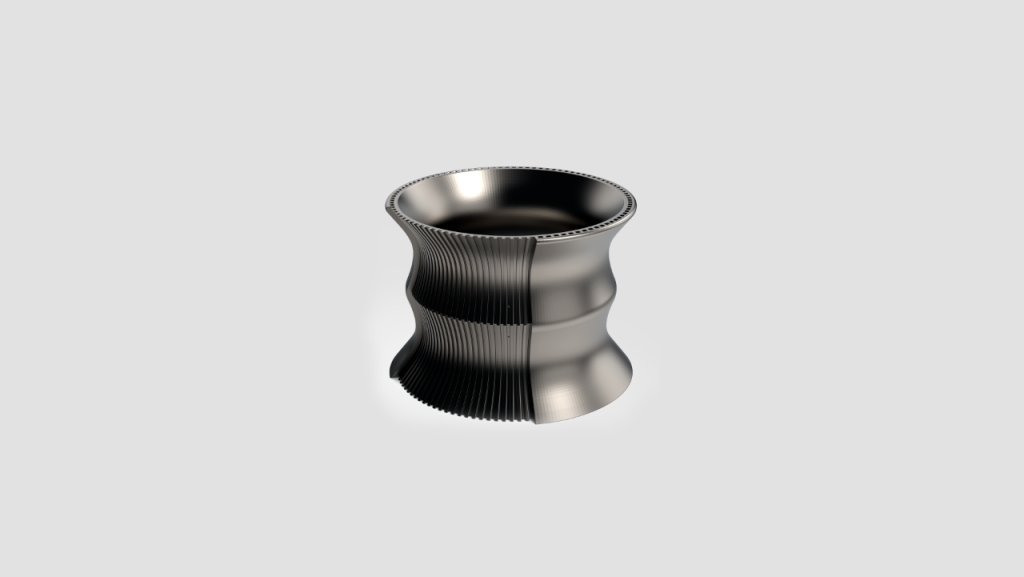
Tekna has introduced advanced Ti64 coarse powders for Laser Powder Bed Fusion (L-PBF) machines, offering increased productivity, cost-efficiency, and safety for additive manufacturing. These powders, designed for thicker layer applications, reduce production time and costs, while enhancing mechanical properties.
Using Tekna’s plasma atomization technology with this material ensures high-density, spherical powders, which are easier to handle due to lower oxygen sensitivity. The powders meet industry standards and are particularly beneficial for industries seeking economic and safety improvements, marking a key advancement in the additive manufacturing market.
Illinois-based 3D printer manufacturer Azul 3D has launched POND, a small-scale 3D printing system designed to accelerate material and application development for its proprietary HARP technology. This strategic release aims to help partners rapidly identify and commercialize disruptive 3D printing applications.
According to the company, POND offers high-resolution printing with a liquid-liquid interface, providing continuous printing and full thermal control. The system is critical for research, as demonstrated by Sandia National Laboratory, which is using it to develop embedded electronics in printed components.
6K’s AM division 6K Additive has expanded its product portfolio by introducing angular chromium (Chrome 99.95% Powder, Chrome 99.8% Powder, Chrome 99.5% Powder, and AT Chrome 99.5% Powder) and titanium (Titanium HDH Powder, Titanium Hydride Powder, and Titanium Sponge Powder) powders, addressing growing demand across industries such as aerospace, energy, and manufacturing. These powders are used in applications like thermal spray, metal injection molding, and additive manufacturing.
With the acquisition of GMP, 6K Additive has enhanced its sustainable manufacturing and recycling capabilities. Noted for their high purity, these angular powders meet rigorous quality standards and open new markets, offering customers more sustainable and high-performance material options.
Portuguese filament manufacturer Filkemp has launched a new line of PLA filaments tailored for the maker segment of the 3D printing industry, emphasizing sustainability and reduced carbon emissions. This move aligns with the company’s commitment to environmental responsibility, aiming for NET zero emissions by 2030.
The PLA packaging is made from 95% recycled materials, highlighting Filkemp’s focus on quality and sustainability for eco-conscious consumers. Additionally, the company has taken steps to reduce its carbon footprint by switching to local suppliers and using renewable energy.
Strong defense contributions from SPEE3D, AML3D, Meltio, and Titomic
Focusing on the defense sector, SPEE3D has announced the conclusion of Trident Warrior, the experimental portion of the Rim of the Pacific (RIMPAC) exercise – at the Marine Corps Air Station in Kaneohe Bay in Hawaii. The company deployed its Expeditionary Manufacturing Unit (EMU), a mobile 3D printing solution.
Using cold spray additive manufacturing (CSAM), SPEE3D printed 11 cast-equivalent metal parts for defense equipment on-site. The aim was to demonstrate how additive manufacturing could reduce the time for repairing or replacing critical military parts, supporting supply chains in contested environments. This exercise underscored the potential of 3D printing in enhancing military readiness.
“SPEE3D is thrilled to be included in RIMPAC, the largest distributed advanced manufacturing demonstration the Department of Defense has ever conducted to date,” said Byron Kennedy, CEO of SPEE3D. “In particular, additive manufacturing has been a major area of interest for the Department of Defense (DoD), and together, we have the same goals to train the military and implement additive manufacturing to print crucial metal parts at the point of need to support modernization and warfighter readiness.”
Australian large-format 3D printer manufacturer AML3D has provided an update on its collaboration with Boeing in its Q4 report, highlighting the finalization of a Defence Manufacturing License Agreement (MLA) with Boeing Defence and Space and its Australian subsidiaries.
This agreement enables AML3D to support additive manufacturing, testing, and inspection of aircraft parts, while complying with US Government regulations for International Traffic in Arms Regulations (ITAR) contracts. The MLA builds on previous collaborations, such as supplying aluminum test parts and 3D printed tooling components, and positioning AML3D for further expansion in the aerospace and defense sectors.
Additionally, AML3D has received an AUD$0.28 million order from Century Engineering to upgrade its robotic welding system to an ARCEMY metal 3D printing system. This modernization will enhance Century Engineering’s capabilities in the Australian Defence, Mining, Power, and Water industries. The deal supports AML3D’s strategy to expand ARCEMY sales into additional markets, including defense and industrial sectors beyond the US.
Moreover, AML3D has commissioned its AUD$2.5 million ARCEMY ‘X-Edition 6700’ 3D printing system for US defense contractor Cogitic Corporation. Now operational, the system will produce metal components for the US Navy’s submarine base, aligning with AML3D’s strategy to expand in the US defense sector. The partnership also opens opportunities to supply Cogitic’s other clients in the aerospace, oil, and gas industries.
AML3D Managing Director Sean Ebert said, “The successful commissioning of this Cogitic ARCEMY X system advances a key objective of AML3D’s US scale-up strategy, embedding our WAM technology in the supply chains for the US defense industry and in particular US Navy’s submarine industrial base. AML3D recently established a US Headquarters and manufacturing hub, in Ohio, to maximize opportunities for ARCEMY system and component manufacturing and testing sales to the US defense sector.”
Lastly, AML3D has signed a Manufacturing License Agreement (MLA) with Blue Forge Alliance, designed to broaden its involvement in producing 3D printed components for the US Navy’s submarine program. Through this agreement, AML3D will gain access to technical data and support from the Navy, enabling it to test, validate, and manufacture a greater variety of submarine parts using its ARCEMY Wire-arc Additive Manufacturing technology.
Metal 3D printing company Meltio has formed a strategic partnership with the French Navy to validate its Wire-Laser Directed Energy Deposition (DED) additive manufacturing technology for military use. Following successful tests, including a repair exercise for the Charles de Gaulle aircraft carrier, the French Navy plans to adopt Meltio’s system for onboard manufacturing and repair.
This partnership is significant as it demonstrates the effectiveness of Meltio’s technology in defense, following its earlier adoption by the Spanish Army and U.S. Navy. According to the company, this collaboration aims to enhance repair capabilities and operational efficiency during military maneuvers.
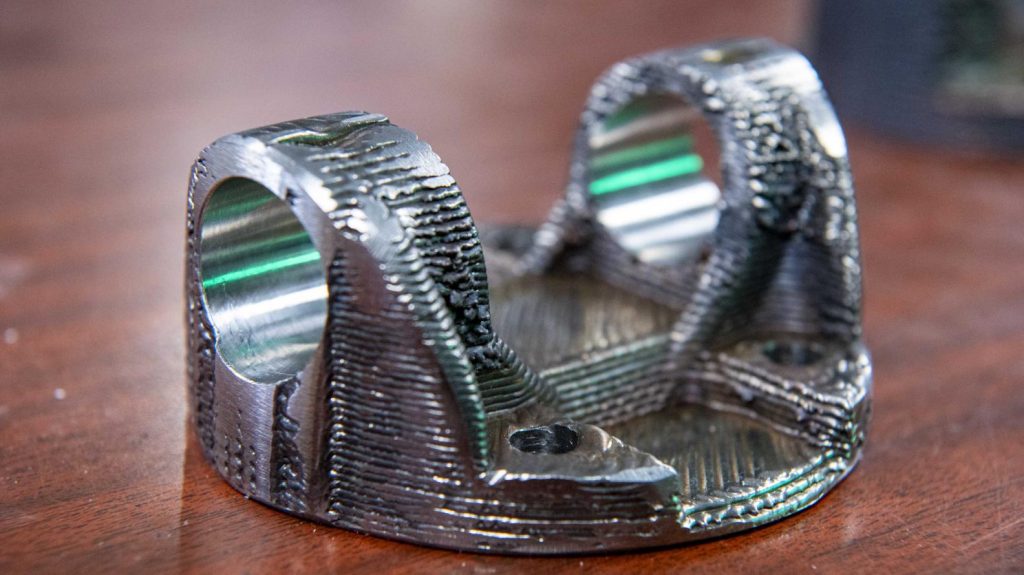
Titomic has secured new purchase orders worth AUD$577k from a major U.S. aerospace and defense company, marking a significant step in its multi-year qualification process with the client. This collaboration aims to expand Titomic’s market presence in the U.S., enhancing its reputation for meeting stringent industry standards with innovative manufacturing technologies.
Titomic says its collaboration highlights Titomic’s progress in providing cold spray solutions for the aerospace and defense industries. The orders contribute to the company’s total of AUD$8M in new orders since March 2024.
Construction news from WASP and Ippolito Fleitz Group
3D printer manufacturer WASP has introduced its Crane WASP architectural 3D printing technology to ESEB and ITS Academy Cantieri dell’Arte. This technology will be integrated into the school’s training and research programs, allowing students to explore sustainable applications in the construction sector. Known for using natural and standardized construction materials, the Crane WASP system aims to promote sustainable development and expand the use of 3D printing in the Italian construction industry.
Ippolito Fleitz Group and Aectual collaborated to create a 3D printed façade for the recently renovated BOSS store at İstinye Park in Istanbul. Made from recycled materials, the design reflects a focus on sustainability and innovation, drawing inspiration from textile weaving patterns to align with the BOSS brand.
Covering 73 square meters with 136 custom-printed panels, the façade provides both aesthetic value and practical functions, including shading. Aectual’s Circular Service allows for the panels to be recycled and repurposed into new products after use.
Aerospace updates by Stratasys and ADS Group
3D printer OEM Stratasys and AM Craft have partnered to boost the demand for flight-certified 3D printed parts in the aviation industry. This collaboration aims to address the aviation sector’s supply chain challenges, particularly in managing replacement parts for long-lived aircraft.
AM Craft’s EASA Part 21G Production Organization Approval enables the production of certified, airworthy 3D printed parts for airlines and OEMs, says the company. By working with Stratasys, AM Craft aims to strengthen its global production network, expand its reach to Southeast Asia and beyond, and enhance customer confidence in 3D printing’s reliability in aviation.
ADS Group has provided its 2024 Facts and Figures report highlighting the significant impact of the aerospace, defense, security, and space sectors on the UK economy, contributing £38.2 billion in 2023, a 50% increase over the last decade.
Employment in these industries has risen by 29% since 2013, reaching 427,500 jobs, with two-thirds based outside of London. Exports have grown by 32%, amounting to £38.7 billion. These sectors show 42% higher productivity than the UK average, underscoring their crucial role in driving economic growth and advancing manufacturing and defense capabilities.
Reseller deals from Farsoon Europe, HeyGears, and more
Farsoon Europe has announced a distribution partnership with MostTech, an Austrian provider of 3D printing solutions. Through this partnership, MostTech will distribute Farsoon’s industrial-grade metal and plastic additive manufacturing technologies, including machines, materials, and services, across the Central European market.
With over three decades of experience, MostTech is well-equipped to expand Farsoon’s reach, enhancing technical capabilities and providing advanced, open 3D printing solutions. The partnership aims to better serve local industries and elevate industrial additive manufacturing in the region.
Large-format 3D printer manufacturer BigRep has partnered with MakerPoint to expand its market reach across the BENELUX region, covering Belgium, the Netherlands, and Luxembourg. Doing so brings BigRep’s large-scale 3D printing solutions, including a variety of low- to high-temperature machines and materials, to local manufacturers.
Through this partnership, industries in the region will gain access to in-house 3D printing technology, enhancing production efficiency. With BigRep’s reputation for large build volumes and reliable machines, MakerPoint will now offer these solutions to meet the increasing demand for additive manufacturing in the area.
3D printing startup Axtra3D has expanded its reach by partnering with Nota3D, now a full-access demo reseller for the Lumia X1 3D printer. This partnership strengthens Axtra3D’s ability to provide better customer support and optimized 3D printing solutions. Molex has also adopted the Lumia X1 to enhance its manufacturing capabilities, particularly for developing prototypes and proof-of-concept applications.
Al Arend, Model Shop Supervisor from Molex, stated, “The early results we are achieving using this new technology are impressive. The piece part detail is crisp and clean when running what are historically challenging materials to print using DLP technology.”
Chinese 3D printer manufacturer HeyGears and PostProcess Technologies have partnered to enhance 3D printing workflows for dental applications. HeyGears will distribute PostProcess’ full-stack post-processing solutions, including hardware, software, and chemistry, alongside its 3D printing systems.
This partnership aims to improve efficiency, safety, and quality in dental labs by streamlining resin removal and eliminating the use of isopropyl alcohol. By combining their expertise, the collaboration will optimize digital dentistry workflows, enabling dental professionals to produce high-quality applications more easily and safely.
Funding news from Fishy Filaments and AMARII
Fishy Filaments has exceeded its £100,000 Crowdcube funding target with over a week to go. Originally aiming to raise £150,000, the successful Alpha Powders trial, completed several months ahead of schedule, reduced the immediate capital requirement.
The company, which turns end-of-life fishing nets into near carbon-free nylon, is advancing its program to produce the world’s first 100% recycled powder for SLS 3D printing. This success could significantly transform its business and help reduce marine waste. Fishy Filaments plans to scale its operations globally with mobile recycling plants.
National Center for Defense Manufacturing and Machining’s (NCDMM) subsidiary AMARII is calling for advanced manufacturing project proposals for its FY 2026 funding cycle. The focus is on projects that could benefit Northeast Ohio’s economy, particularly those related to additive manufacturing, automation, AI, energy efficiency, and supply chain enhancement.
Priority will be given to projects that advance manufacturing technologies, promote job growth, and enhance competitiveness. AMARII has previously secured over $100 million in funding, emphasizing its success in supporting regional innovation, says the company.
Certifications and standardization news from 3D Systems and Aerosport Additive
3D printer manufacturer 3D Systems’ Leuven, Belgium site has received ISO ASTM 52920 certification, enhancing its ability to provide high-quality additive manufacturing (AM) solutions across sectors like aerospace, healthcare, defense, and semiconductor equipment. Covering a wide range of 3D printers and materials, this certification reinforces the company’s commitment to meeting regulatory standards and advancing its AM capabilities for complex applications in regulated industries.
Additive manufacturing company Aerosport Additive is celebrating the first anniversary of its ISO 9001:2015 certification. Over the past year, the certification has helped the company enhance trust with clients across various industries, including automotive, medical, and aviation, by ensuring consistent production standards. Founder Geoff Combs noted that the certification has supported continuous improvements in processes and service delivery.
3D printing applications from CRP USA, Xover0, and more
Yale University’s School of Engineering has introduced a ceremonial mace designed by graduate Jacob Eldred, showcasing the progression of engineering through various materials and manufacturing techniques.
The mace features a base of hand-carved wood, transitioning to brass, copper, aluminum, and stainless steel. A key component near the top, produced by Incus using 3D printing technology, demonstrates advanced manufacturing capabilities with intricate geometries that are difficult to achieve through traditional methods.
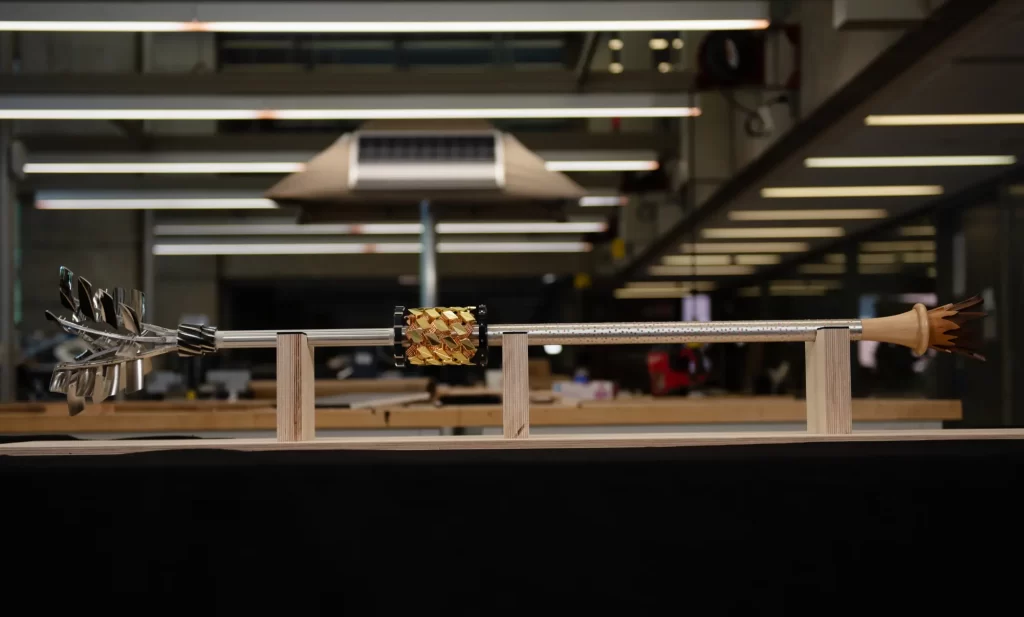
CRP USA teamed up with Paralympic champion Tatyana McFadden to develop advanced 3D printed wheelchair racing gloves. Utilizing Selective Laser Sintering and Windform XT 2.0, the gloves offer superior strength, durability, and reduced weight, significantly enhancing McFadden’s racing experience. Designed to endure high friction and tough conditions, these gloves provide both comfort and performance.
Xover0, a 3D printing jewelry studio specializing in intricate designs has announced that its Geoheart necklace is featured in the latest Netflix film Uglies, starring Joey King. Inspired by Art Deco architecture, the pendant was chosen for its unique heart-shaped, airy design, complementing the futuristic aesthetic of the film.
“It’s beyond thrilling,” said co-founder Katherine Voorhies, one of the two design visionaries behind Xover0. “When Costume Designer Cris Araujo reached out to us we were immediately excited by the opportunity. Cris has an impressive resume, so we knew our design was in good hands. And Joey King is not only amazingly talented as an actor, but she also has an uncanny eye for fashion. So it was a dream that they chose our Geoheart Pendant for such a prominent role in the plot of Uglies.”
Law and regulatory news from 3D Labs and Stratasys
3D Lab has obtained patents in both the USA and China for its ultrasonic atomization technology, which enhances the production of high-quality metal powders for additive manufacturing and other industrial uses.
The U.S. patent covers a method and apparatus for producing heavy metal powders, while the Chinese patent focuses on the evacuation process of powders made through ultrasonic atomization. Both patents are key to the ATO series, particularly the ATO Lab Plus, a modular ultrasonic metal atomizer designed for laboratory-scale production. This technology improves flowability, particle size control, and reduces oxygen content, making it useful for sectors such as aerospace, automotive, medical devices, and 3D printing.
In a Securities Exchange Commission (SEC) filing form 6-K Stratasys has announced a $50 million share repurchase program, authorized by its Board of Directors, aimed at enhancing shareholder value. This move aligns with Stratasys’ broader strategy to improve profitability and cash flow by driving revenue, aligning costs, and reinvesting in growth.
Alongside the repurchase plan, the company is implementing a restructuring initiative expected to save $40 million annually by 2025, including a 15% workforce reduction. The repurchases will be tied to market conditions, ensuring financial flexibility for ongoing investments.
Software updates from United Grinding Group and Quickparts
The UNITED GRINDING Group has adopted the umati interface to streamline data integration from diverse machines, including older models, in its production environment. By networking machines from various manufacturers, like DMG Mori and WALDRICH COBURG, the group optimizes production efficiency and enables real-time monitoring. This project at STUDER demonstrates how umati modernizes older machines, contributing to the group’s goal of establishing a global machine tool communication standard.
Prototyping company Quickparts has launched QuickQuote, an online tool that simplifies requests for volume manufacturing in CNC machining, injection molding, and additive manufacturing. Customers can easily submit project details and receive customized quotes.
The tool supports large-scale production with a dedicated project management team. Quickparts provides comprehensive services, including product lifecycle support, global manufacturing capacity, and strict quality assurance, helping customers scale from prototyping to full production.
New research unveils methods to strengthen AM materials and enhance performance
Engineers from the University of Glasgow’s James Watt School of Engineering and Polytechnic University of Marche in Italy have developed new insights into the deformation mechanisms that cause 3D-printed materials to fail under strain. Their analysis focused on polyetherimide (PEI) lattice structures, revealing how defects, particularly “interlayer damage,” weaken the material.
By developing an “enhancement factor” tool, the team can now predict and minimize these defects, improving material performance. The findings, published in Advanced Materials Technologies, could lead to stronger, lighter 3D-printed materials for industries like aerospace and automotive, unlocking benefits in safety and fuel efficiency.
TRUMPF reports sales decline amid global economic challenges
German machine tool manufacturer TRUMPF the high-tech company, reported a decline in both sales and order intake for fiscal year 2023/24. Sales decreased by 4% to €5.2 billion, while order intake dropped by 10% to €4.6 billion. Despite a 4.5% increase in sales in Germany, making it TRUMPF’s largest market for the first time in years, sales fell by 12% in the U.S. and remained stable in China.
The company attributes this decline to the weak global economy and ongoing geopolitical uncertainties, which have led to a noticeable reduction in customer investments. Despite these challenges, TRUMPF plans to counter the economic downturn with clear measures to improve earnings.
AM Efficiency launches CCP-20 Megadrum for automated 3Dprint cleaning
AM Efficiency has unveiled the CCP-20 Megadrum, a machine designed to automate the cleaning process for large 3D prints and large print batches, compatible with SLS, MJF, and SAF technologies.
This solution aims to streamline production, reduce energy costs, and enhance workplace ergonomics by eliminating the need for manual handling. With a focus on Industry 4.0, the CCP-20 delivers consistent, automated results. Set for delivery in September 2024, the system is expected to pay for itself within a year, offering significant economic and operational advantages.
Experts recognized for breakthroughs in AM at SFF symposium
Denis Cormier and Bey Vrancken have been recognized for their significant contributions to additive manufacturing at the Solid Freeform Fabrication Symposium (SFF). Cormier, from Rochester Institute of Technology, received the FAME Award for his work in lattice structures and molten metal droplet jetting.
Vrancken, from KU Leuven, was honored with the Jr FAME Award for his advancements in heat treatments, alloy design, and process monitoring in laser powder bed fusion. These awards highlight their impact on the field of 3D printing and manufacturing innovation.
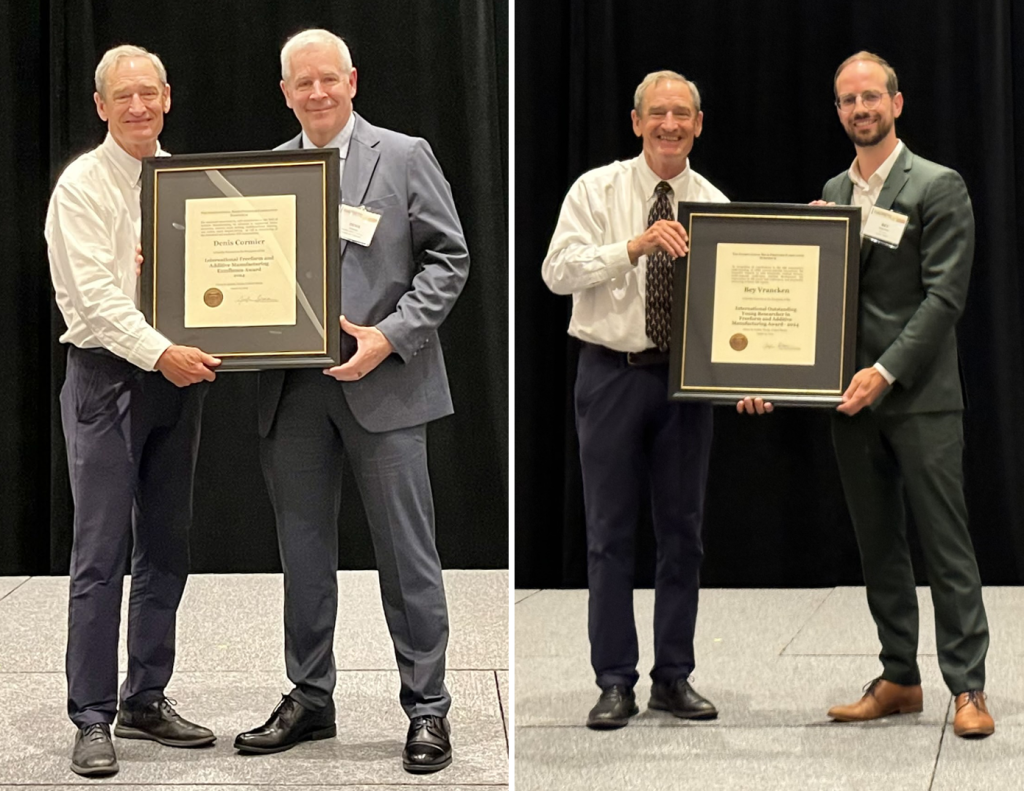
What 3D printing trends do the industry leaders anticipate this year?
What does the Future of 3D printing hold for the next 10 years?
To stay up to date with the latest 3D printing news, don’t forget to subscribe to the 3D Printing Industry newsletter or follow us on Twitter, or like our page on Facebook.
While you’re here, why not subscribe to our Youtube channel? Featuring discussion, debriefs, video shorts, and webinar replays.
Featured image shows 3D printed ceremonial mace. Photo via Yale University.



